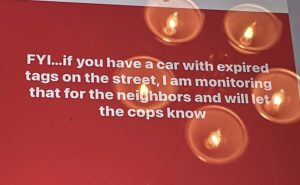In many neighborhoods, it’s not uncommon for residents to keep an eye on each other’s property, ensuring that the community remains safe and orderly. However, there’s a fine line between being a vigilant neighbor and becoming an overly zealous one, especially when it comes to calling the police over minor issues such as expired vehicle tags.
Expired vehicle tags are indeed a violation of local regulations. Law enforcement agencies and vehicle registration offices emphasize the importance of keeping vehicle tags up to date. This ensures that vehicles are legally on the road and that owners are compliant with state and local tax obligations. However, the context and circumstances of the violation often determine the necessity and appropriateness of involving the police.

In situations where a vehicle is clearly disabled and has been left abandoned on a public street, calling the police is a reasonable action. Abandoned vehicles can become safety hazards, attract crime, and reduce the aesthetic value of a neighborhood. Reporting such vehicles ensures that they are promptly removed and that the street remains clear and safe for all residents.
Conversely, calling the police on a neighbor’s vehicle that is simply parked on the street with expired tags, but is otherwise functioning and used regularly, is another story. Such calls can be seen as a misuse of police resources, which could be better spent addressing more serious community concerns. It can also strain relationships between neighbors, fostering an environment of mistrust and animosity.
Police departments operate under tight budgets and resource constraints. Every call made to the police involves time, manpower, and financial resources. When officers are dispatched to address minor infractions like expired tags on a functioning vehicle, it diverts their attention from more critical duties, such as responding to emergencies or patrolling high-crime areas. Repeatedly involving law enforcement in minor neighborhood disputes can lead to resentment and tension among residents. It creates a hostile environment where neighbors are pitted against each other, rather than working together to foster a sense of community. While it is within a citizen’s right to report violations, repeatedly calling the police for minor issues can sometimes backfire. Authorities may deem these calls as frivolous, and in extreme cases, individuals could face repercussions for misuse of emergency services.
Before picking up the phone to call the police, consider alternative ways to address the issue. Engage in a friendly conversation with your neighbor. Politely inform them of the expired tags and express your concerns. Often, a simple reminder is all that’s needed for the owner to rectify the situation. If your community has a neighborhood association or homeowners’ association (HOA), raise the issue with them. These organizations often have protocols in place to handle such matters without involving law enforcement. Many municipalities offer non-emergency services to address minor infractions. Check if there are local government resources that can handle the situation without the need for police intervention.
While it’s important to maintain order and ensure that all vehicles on the street are properly registered, it’s equally important to use discretion and judgment. By reserving police involvement for more serious matters and finding alternative ways to address minor infractions, neighbors can contribute to a more harmonious and cooperative community. After all, the goal is to create a neighborhood where everyone feels safe, respected, and part of a supportive community network.
So, what about you? Do you have a neighbor who’s always ready to call the cops over every little thing, like expired tags on a perfectly fine car? Or maybe you are that neighbor? Either way, let’s hear your stories—because every neighborhood has at least one!

